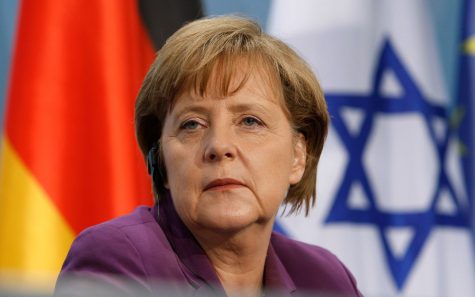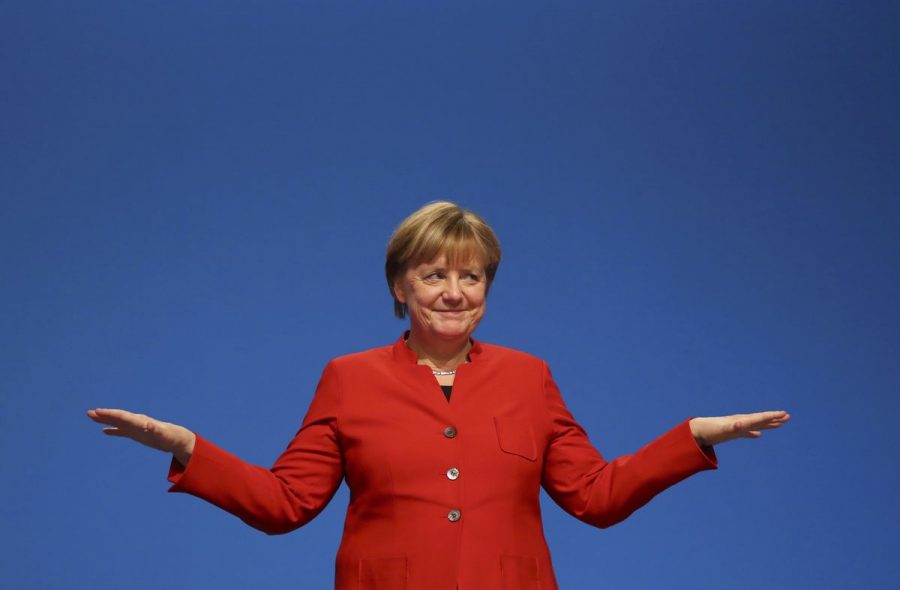The End of an Era for Germany
As Merkel’s last term as Chancellor culminates, Germany sees a more progressive future ahead.
The end of an era for Germany came on September 26, as their first election without Angela Merkel as a candidate in sixteen years commenced. Over Merkel’s last four terms, she became a political icon, leading Germany through both difficult and prosperous times. In her wake comes a shift in German political leadership. The center-left Social Democrats (SPD) and their leader, Olaf Scholz, came out ahead, with Merkel’s Christian Democrats (CDU) losing much support from previous years but pushing into the second position in the race nonetheless. The SPD will now be forced to form a coalition (group of parties) with one or two other parties to form a majority in the German parliament. Merkel leaves behind an important legacy, and Germany’s future will look different without her.
Merkel was born in Hamburg, West Germany, in 1954, and weeks later her father moved their family to Templin, East Germany, where Merkel would spend much of her early life. Her father was a Lutheran pastor, and, as a result, Merkel had a much different childhood from many of the other children her age in Communist East Germany, where religion was discouraged. Merkel learned from a young age to hold opinions that many others around her did not share. After high school, she went on to the University of Leipzig in East Germany for college, where she studied physics, and then to the German Academy of Sciences in East Berlin, where she earned a Ph.D. for quantum chemistry in 1986. In 1989 the fall of the Iron Curtain and the reunification of Germany galvanized Merkel out of her brief career at a state-sponsored research center in East Germany and into the world of politics as a part of the Democratic Awakening Party.
Shortly after, she joined the center-right CDU, the largest party in Germany at the time, and, in 1999, after rising through the ranks, she made a name for herself. During her time at the CDU, Merkel came under the wing of Helmet Kohl, the then-Chancellor of Germany. He became a mentor to her and granted her several governmental positions, such as Minister for Women and Minister of the Environment. All would not be well for Kohl, however, and, in 1999, he was discovered giving party funds to friends in a large political scandal. Merkel, though, chose not to defend her old mentor and sent a letter to a newspaper, publicly asking her party to oust Kohl.
After she was chosen to lead the CDU in 2000, Merkel and the CDU beat out the SPD and their leader, Gerhard Schröder, in the 2005 election, making Merkel the new chancellor and marking the beginning of Merkel’s impressive sixteen-year lead in Germany.
Her first feat came in her actions during the European debt crisis in the late 2000s and early 2010s. At the time, much of Europe was going through large financial issues, but Greece looked ready to fall into bankruptcy at any moment. The concern was that if Greece fell, the Euro would fail, and the rest of Europe would soon follow. Merkel decided to create legislation to bail out Greece, and, in doing so, save Europe from further economic disaster. Her decision was not popular at the time by any stretch. Germans felt that Greece’s financial issues were Greece’s fault, and Greece paid a price through austerity measures (strict economic policies). Even today, many Greeks feel that Germany’s bailout harmed the country, but, nonetheless, Greece is no longer in financial peril to that extent, nor is the rest of Europe.
Merkel made headlines again in 2015, during the mass influx of migrants into Europe. At this time, tens of thousands of migrants from the Middle East, especially Iraq, Afghanistan, and Syria, as well as from North Africa, were fleeing violent conflict. When nobody knew what to do with the migrants, Merkel welcomed them to Germany. Her decision came with mixed responses. Some Germans welcomed the migrants with open arms, but there was severe backlash from other groups. Following the decision, a far-right party gained seats in the German parliament for the first time since WWII, and Merkel’s position seemed unstable, but she came through it unscathed. In hindsight, her immigration policies at this time appear to be a success. Many refugees became deeply integrated with German culture and were able to go to university, get jobs, and pay taxes.
Despite Merkel being lauded by many, there is a feeling among some that her successes came not by her own accord, but by a unique political position, which she could have used more effectively. Jan-Werner Müller, a professor of politics at Princeton University, said, “Merkel was successful in keeping her own party, various large coalitions, and the EU together at crucial moments. But she could only do so because, during a boom based on German exports, there was always enough money to buy everyone’s consent…. she was uniquely placed globally to have done more on the climate emergency – and simply failed to do so.” Müller goes on to describe how many of Merkel’s perceived progressive heroics had sinister undertones. Despite what she was able to do, there was much more opportunity that she did not take hold of, instead choosing to take a safer, more conservative approach to ensure reelection.

The CDU’s prospects throughout the 2021 election were dark, as Merkel chose to transition out of politics. Her party, which led the number of seats in German parliament during her chancellorship, saw its worst turnout since WWII. The fall of such an important part of German politics, especially over the last sixteen years, can be attributed to several factors. Since 2015, internal power struggles, a lack of policy ideas, and corruption scandals involving CDU members have plagued the historic party. Merkel’s chosen successor, Armin Laschet, also turned out to be a political mistake. He was seen as an uninspiring campaigner, and there were even those in his own party who did not see him fit to lead.
With Merkel’s transition out of power, German politics takes on a new shape. Although the SPD leads the vote count in the preliminary counts, the Green Party (Greens) and the Free Democratic Party (FDP) are the kingmakers, meaning they could side with either the SPD or the CDU. Olaf Scholz, the finance minister and vice-chancellor prior to the election, is working to form a new coalition between the SPD, Greens, and the FDP. His position to lead Germany seems likely, but failed coalition talks could see his position snatched by someone else. It is also possible that the CDU, FDP, and Greens could form a coalition, but that is not as likely. Scholz is not as politically experienced as Merkel overall, but his previous experience as finance minister and vice-chancellor will lend themselves well to the chancellor’s position.
Under a “traffic light” coalition (green Greens, yellow FDP, and red SPD), climate policy and fiscal policies for both Germany and Europe will be high on the ticket of priorities. The SPD and FDP share a more conservative, regulatory fiscal policy base, with more liberal social policies. The Greens prioritize environmental and social-justice issues.
With the FDP and Greens’ rise into important political positions, and as fewer voters showed up for the older, more traditional SPD and CDU parties, Germany began to see what experts say is a generational shift in politics. 21 percent of voters under 25 voted for the FDP and another 23 percent of this group voted for the Greens in this year’s election. The SPD and CDU were held up largely by voters in older age groups. This shift away from these two parties in young age groups, despite them still being the largest by total voter percentage, is likely a sign of greater change to come. The country is moving towards younger, more progressive politicians, marking the beginning of a new age of German politics.

Darin Eberhardt '25 has been working with the Advocate since 7th grade and joined the Editorial Board in early 2023. Always finding ways to keep his schedule...







